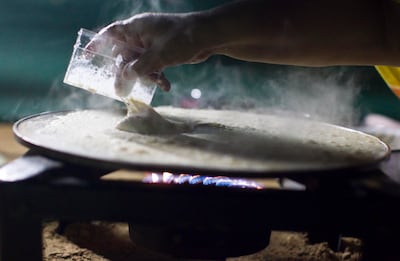This Arabic word of the week can allude to parched weather and dehydration as much as it can describe a person or greeting.
Nashef is Arabic for dry. The word can be used when referring to laundry, el ghaseel nashef; clothes, al thiyab nashefa; or moistureless weather, al taqs nashef.
But nashef gets more interesting when applied to people.
Wajho nashef can be used to describe a man who grimaces often. For a woman, it would be wajha nashefa. If you want to confront a scowl head-on, it can be wajhak/wajhik nashef/nashefa.
Kalamo/kalamha nashef/nashefa can be said of those who have a certain coarse and curt way of speaking. To someone who greets you in an aloof manner, you can even say istiqbaluka/istiqbaluki nashef/nashefa.
Of course, the word can be used to describe foods as well, el akl nashef. Dry bread is khobz nashif. Dry fruit translates to fawakeh nashefa.

Of parched earth, you could say turab nashef. When your car has dried after a wash or rainfall, you can say nashafat al sayara. If your pockets are running empty, you could say nashaf jaybi.
Much like its English translation, nashef can also be used to describe medical conditions. A dry cough is soual nashef. Dryness of the eyes, skin or mouth is nashafan el ain, jild or famm respectively. Dehydration is nashafan el jism.
If you’re thirsty you could say neshef reeie. You could also say it when you’re scared and your mouth feels dry.
Nashef has as many uses as the English word dry, but if you're not fluent in Arabic yet, maybe steer clear of using it when referring to people, especially if you want to avoid hurting anyone's feelings. Better to keep within the confines of food, textiles and the weather.


